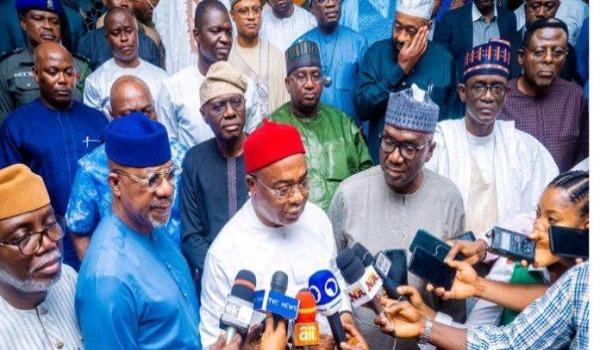Energy expert says Nigeria’s only active refinery should be treated as national asset; Dangote refinery insists crude supply woes persist
Energy expert and Co-Founder/ CEO of Dairy Hills, Kelvin Emmanuel says Nigeria’s government should adjust its strategies to ensure Dangote Refinery is guaranteed crude supply. He said FG should treat Dangote Refinery as a national asset as it is the only active refinery in the country.
He made this remark in an interview with ARISE NEWS on Friday, where he urged the government to make changes in its strategy to ensure that crude is supplied to Dangote refinery.
He said, “The only active functional refinery in Nigeria is Dangote, and I will tell you why. Because the modular refineries cannot produce PMS, modular refineries do what they call primary refining, they don’t have what they call catalytic reformer that helps you to do secondary refining to convert NAFTA, which is the base you use to produce PMS, into PMS.
“And for modular refineries that are anywhere between 50 and $70 million to construct between 7 and 10,000 barrels refining capacity per day, the catalytic reformer will cost you anywhere between 25 and $30 million. So far, it’s only one company in Nigeria- Aradel- that is making an attempt to install a catalytic reformer for secondary refining of petroleum to convert NAFTA into PMS. So, the only active refinery in Nigeria that can actually refine NAFTA compound into PMS is Dangote refinery.”
The energy expert, then speaking on the lag in the supply of crude to Dangote refinery, said, “Nigeria is no longer a country without a functioning refinery, Nigeria has a functioning refinery. Now, the question is does it make business sense to invest in the modular refineries and ensure they have catalytic reformers which only four companies, globally by the way, has license to sell, so that they can do secondary refining for NAFTA, which is the base compound, into PMS?
“Well, it might make sense, but now the question you want to ask is if we already have a functional refinery that can do up to 650,000 barrels processing capacity and can produce up to 49.4 million litres of PMS daily, why are we not supplying it feedstock?”
Emmanuel said “If Dangote is saying that, listen, NUPRC is actually not enforcing domestic crude oil supply obligations, and the gazette it produced based on this year so, it is completely within the law. He’s not saying anything that is extraordinary, he’s not asking for any special favours.”
“It’s important for the Nigerian government to adjust its strategy to ensure that it can guarantee supply to Dangote Refinery, Dangote refinery should be classified as a critical national asset,” he added.
He then outlined the consequences of Nigeria not supplying crude oil to the Dangote refinery as he said, “The risk is this. If, for example, for the month of September, it’s gotten six cargoes, it’s owed nine cargoes, it’s not gotten nine cargoes, Dangote is spending- at 450,000 barrels per day, they’re spending anywhere between $960 million a year on crude oil feedstock. If it has to import feedstock, the business case will make absolute sense for it to also export its derivatives to other countries and not bring it to Nigeria.
“Nigeria will lose out on two things- it will lose out on security of supply, it will also lose out on possible FX revenues from net export proceeds it needs to stabilise its FX market at such a critical time as this.”
Meanwhile, Africa’s largest oil refinery, Dangote Refinery, has reiterated its challenges in securing adequate crude oil supply for its operations, despite claims of increased allocation from the Nigerian National Petroleum Company (NNPC).
In a statement on Thursday, Anthony Chiejina, the Dangote Group’s Chief Branding and Communications Officer, said the refinery’s primary issue lies with the Nigerian Upstream Petroleum Regulatory Commission (NUPRC) for its alleged failure to enforce the domestic crude supply obligation.
According to Dangote, while NNPC has supplied a portion of the required crude, the volume falls significantly short of the refinery’s needs. The company claimed to have been unable to secure the remaining portion from both NNPC and International Oil Companies (IOCs).
The statement read: “Our attention has been drawn to media reports alleging that the Dangote Refinery has backtracked by acknowledging that NNPC supplied about 60% of the 50 million barrels we lifted.
“To clarify, we have never accused NNPC of not supplying us with crude. Our concern has always been NUPRC’s reluctance to enforce the domestic crude supply obligation and ensure that we receive our full crude requirement from NNPC and the IOCs.
“For September, our requirement is 15 cargoes, of which NNPC allocated six. Despite appealing to NUPRC, we’ve been unable to secure the remaining cargoes. When we approached IOCs producing in Nigeria, they redirected us to their international trading arms or responded that their cargoes were committed.”
As a result, Dangote has been compelled to purchase Nigerian crude from international traders at inflated prices, incurring additional costs of $3-$4 million per cargo.
“We therefore still insist that we are unable to secure our full crude requirement from domestic production and urge NUPRC to fully enforce the domestic crude supply obligation as mandated by the Petroleum Industry Act (PIA),” the statement read.
Devakumar Edwin, the Vice President of oil and gas at Dangote Industries Limited, had earlier said that if the Domestic Crude Supply Obligation guidelines are diligently implemented, it will foster deals directly with the companies producing the crude oil in Nigeria as stipulated by the Petroleum Industry Act.
Edwin maintained that IOCs operating in Nigeria have consistently frustrated the company’s requests for locally-produced crude as feedstock for its refining process.
According to him, when cargoes are offered to the oil company by the trading arms, it is sometimes at a $2 to $4 (per barrel) premium above the official price set by the Commission.




